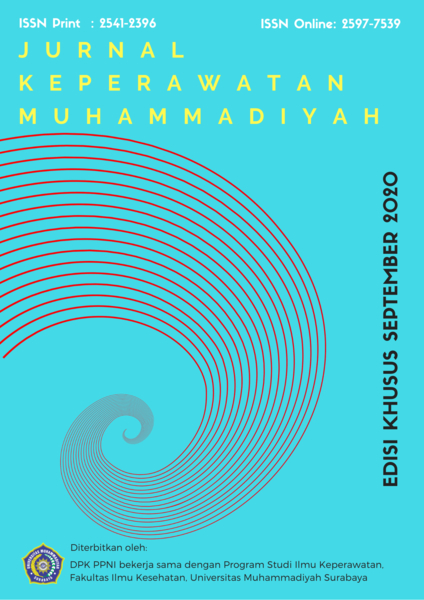Hubungan penggunaan media sosial, religiusitas dengan agresifitas mahasiswa fakultas ilmu kesehatan universitas muhammadiyah purwokerto
DOI:
https://doi.org/10.30651/jkm.v0i0.5222Keywords:
Penggunaan Media Sosial, Religiusitas, AgresifitasAbstract
Background: Aggressivity was the behavior of individuals who intended to injure or harm other individuals who did not want this to happen. One of the causes of the emergence of aggressivity was the lack of basics of the faith. One of the factors that influenced aggressiveness was self-control which was obtained through the practice of religious values. Another factor that could affect aggressivity was social media. Social media has gradually brought us to a new cultural pattern and determined our mindset. Individual thought patterns would influence attitudes and behaviors including aggressivity. Objective: To figure out the correlation between the use of social media, religiosity and the aggressiveness of students of Health Science Faculty of Universitas Muhammadiyah Purwokerto. Method: The study was quantitative research by using correlation description design with cross sectional approach. The samples were taken by using simple random sampling technique. There were 71 people as the samples. Questionnaire of social media used Social Networking Usage Questionnaire: Development and Validation in an Indian Higher Education Context. Questionnaire of religiosity used The Centrality of Religiosity Scale (CRS), questionnaire of aggressivity used Aggression Questionnaire-Journal of Personality and Social Psychology questionnaire. The data were analyzed by using Chi Square test. Results: The results showed that based on Chi Square test, the relationship between the use of social media and aggressiveness obtained p = 0.0001. The relationship between religiosity and aggressivity obtained p = 0.0001. Conclusion: There is a correlation between the use of social media, religiosity and aggressivity of the students of Health Science Faculty, Universitas Muhammadiyah Purwokerto. Keywords: use of social media, religiosity, aggressivityReferences
Barkowitz, L. (2011). Emotional Behavior: Mengenai Perilaku & Tindakan Kekerasan di Lingkungan Sekitar Kita & Cara Penanggulangannya. Buku Kesatu. Alih bahasa: Hartanti Woro Susiatni. Jakarta: Penerbit PPM.
Firdaus (2009). Hubungan Antara Religi usitas dan Kecenderungan Body Dissactife Action Pada Remaja. Skripsi. (Tidak Dipublikasikan). Surakarta: UMS
Fitrianisa, A. (2018). Identifikasi Faktor-Faktor Penyebab Perilaku Agresif Siswa SMK PIRI 3 Yogyakarta. Skripsi. Program Studi Bimbingan Dan Konseling Fakultas Ilmu Pendidikan Universitas Negeri Yogyakarta
Glock., C. Y., and Stark., R. (2008). American Piety : The Nature Of Religious Commitment. Berkeley: University of California Press
Hawari, D. (2013). Dimensi Religi Dalam Praktek Psikiatri Dan Psikologi. Jakarta: Balai Penertiban FKUI
Istiqomah (2017). Penggunaan Media Sosial dengan Tingkat Agresivitas Remaja, (Online), Vol.13 No.2.
Jalaluddin, R. (2012). Psikologi Agama. Jakarta: RajaGrafindo
Joshi S., Shilpa, K., Madhu, J. (2012). Religiosity as Related to Women’s Health. Delhi Psychiatry Journal Pshicologi. 15(1) 1-7.
Kim, S, Orpins, P., Randy, Kamphaus, R., & Kelder, S. H. (2011). A Multiple Risk Factors Model Of The Development Of Aggression Among Early Adolescents From Urban Disadvantaged Neighborhoods. School Psychology Quarterly.
Koeswara, E. (2011). Agresi Manusia. Bandung: PT Erasco
Koenig, H.G. (2010). Religion and medicine II: Religion, mental health, and related behaviors. International Journal of Psychiatry in Medicine, No.31, 97109.
Kuniadarmi, E. (2012). Psikologi Perkembangan. Bogor: Penerbit Puspa
Myers, D. G. (2012). Psikologi Sosial. Ed. 10., Jil. 2. Jakarta: Penerbit Salemba
Nasrullah, R. (2012). Media Sosial Perspektif Komunikasi, Budaya, Dan Sosioteknologi. Jakarta: Simbiosa Rekatama Media
Santrock, J.W. (2010). Perkembangan Remaja, Jilid 2 (Edisi 11). Jakarta: Erlangga
Septiani, P.S. (2015). Hubungan Perilaku Religiusitas Dengan Sikap Agresif Pada Siswa SMK Piri Sleman. Naskah Publikasi. Program Studi Ilmu Keperawatan Sekolah Tinggi Ilmu Kesehatan ‘Aisyiyah Yogyakarta
Siaganingtyas, C. (2018). Hubungan Antara Religiusitas Dengan Perilaku Moral Siswa di SMKN 8 Surakarta. Naskah Publikasi: Twinning Program Fakultas Psikologi & Pendidikan Agama Islam Universitas Muhammadiyah Surakarta.
Smahel, D., Brown, B.B., & Blinka, L. (2012). Associations between Online Friendship and Internet Addiction among Adolescents and Emerging Adults. Developmental Psychology 48 (2) : 381-288
Soliha, S.F. (2015). Tingkat Ketergantungan Pengguna Media Sosial Dan Kecemasan Sosial. Jurnal Interaksi, Vol. 4 No. 1, Januari 2015 : 1 - 10. Program Studi Magister Ilmu Komunikasi FISIP UNDIP
Straubhaar, J., LaRose, R., & Davenpo, L. (2011). Media Now: Understanding Media, Culture, and Technology, 7th edition, Wadsworth, Cengage Learning, United States of America
Willis, S. (2012). Remaja Dan Masalahnya. Bandung: Alfabeta
Yosep, I. (2011). Keperawatan Jiwa. Bandung: PT Refika Aditama
Downloads
Published
Issue
Section
License
- Penulis tetap memegang hak atas karyanya dan memberikan hak publikasi pertama kepada jurnal ini yang secara simultan karya tersebut dilisensikan di bawah:Â Creative Commons Attribution-ShareAlike 4.0 International (CC BY-SA 4.0)













